
|
|
Farm Forum focuses on EPA, public awareness
By Bob Robinson
Editor
PIQUA – “We are nine meals away from chaos,” said Ohio Agricultural
Director Jim Zehringer.
The moderator for Congressman John Boehner’s (8th District) 20th Annual
Farm Forum at Edison Community College noted that grocery stores
typically stock three days worth of food…
“What would happen if the food supply suddenly stopped?”
Nearly 300 people packed Edison’s auditorium Saturday for Boehner’s and
Zehringer’s updates on agriculture and the economy, plus the comments
of four panelists and Keynote Speaker Bob Stallman, President of the
American Farm Bureau Federation. See brief bios here.
Boehner opened the discussion by noting that when he went to Congress
21 years ago, he said then that we would have to deal with government
spending. Nothing was done. It has to be dealt with now. After noting
that for the first time in the nation’s history, the Democratic
Congress did not produce a federal budget last year, he said they now
have to deal with it, and Obama’s spending had to be stopped.
“There was a commission of 18 people that the President appointed (to
make budget recommendations). They did some very good work,” he said.
“The president’s budget included ‘zero’ of their recommendations.”
“Our team is not going to shy away from the difficult decisions we have
to make.”
Zehringer talked about the great job agriculture is doing promoting ag
products: “The incredible edible egg,” “The other white meat,” “Got
milk?”
But we’re not doing a good job telling how we do it, he added.
While the successes and accomplishments of U.S. agriculture were noted,
the theme revolved around what the EPA had in store for the industry
and promoting agriculture to the public.
Susan Bodine, counsel for the Agricultural Nutrient Policy Council,
said the U.S. EPA has agriculture in its sights.
“Most of what I have to tell you is ‘doom and gloom,’” she said, “but
there is a ray of hope.”
She said that EPA is feeling the pressure… “Your voices are being
heard.” She noted, however, that EPA is working with environmental
groups - going after animal feeding operations; and going after
nutrients.
“Nitrogen and phosphorus are being targeted, but the information is not
accurate,” she said. They are forcing states to establish numeric
limits for all nitrogen and phosphorus in state tributaries based on
incorrect information.
“We’re fighting back… we’re demonstrating successes (which EPA
excluded). Positive things are happening.”
Colin Woodall, vice president of Government Relations for the National
Cattlemen’s Beef Association, told the group that the “administration
speaks with forked tongue.”
He said that Pres. Obama talks about repopulating rural America but his
“regulations are doing everything they can to put us out of business.”
He noted as one example the EPA establishing regulations regarding
“coarse particulate matter.”
That’s dust, he said.
“Agriculture has dust! Dust happens! If the regulations are passed,
pretty much all of the Western United States will be out of compliance.”
He noted that a bi-partisan vote in the House stopped EPA in its
tracks… but added that the industry can’t rest.
“Write your representatives,” he said. “If you don’t, somebody else
will, and those groups don’t have your best interests at heart.”
He reminded the group that agenda is more important to these groups
than accurate information.
“Don’t confuse them with the facts,” he said. “They don’t want to hear
it.”
Scott Nally, director of the Ohio EPA, said farmers have to distinguish
between the Ohio EPA and the U.S. EPA, noting that if he didn’t do what
the agency wanted, “they will go around me, through me or whatever to
get it.”
“I’m not afraid to make the tough decisions,” he said. “Some things
have to have common sense, based on science, and I’d rather guide it at
the Ohio level, not the U.S. level.”
Nally noted that the top three items on the EPA list are:
confined/concentrated animal feeding operations; extraction of minerals
(coal); and fuel resources (nitrogen).
Jay Broom, president and CEO of CropLife America, noted the
misunderstanding of the industry by “self-appointed urban elites” such
as Merryl Streep.
“They don’t know (or care) how we feel about our industry. We need to
address public opinion… those of us in agriculture need to stand up and
speak with authority and the facts, and do it passionately,” he said.
Featured speaker Bob Stallman said the American Farm Bureau Federation
has been in court against the EPA many times.
“It’s bigger than ever,” he said. “It has a $10 billion budget and
17,000 employees.”
He said agriculture is all about producing and “we are good at it!” He
noted that agriculture is producing 250 percent more with less.
Success, however, is being hindered by internal forces and “our own
government,” he added.
“We are good stewards of our land,” he said. “We feed and clothe the
people of our great nation.”
Boehner told the group that it’s time to get the EPA off the family
farm and doing something constructive.
“Why should an heir have to pay inheritance on a farm they helped to
build?” he asked. He said Congress is working on an inheritance fix,
but noted the process was challenging…
“Trying to bring common sense to the bureaucracy is an oxymoron,” he
said.
Woodall summed up one common theme from all speakers: “There are no
better stewards of air, land, water and animals than those of you in
this room.”
Boehner wrapped up the morning with two responses to questions from the
audience.
What to do about Gore? “Never forget,” Boehner said. “When your
political opponent is committing suicide, it’s not necessary to kill
him.”
What can government do to create more jobs?
“Get the hell out of the way!”
|
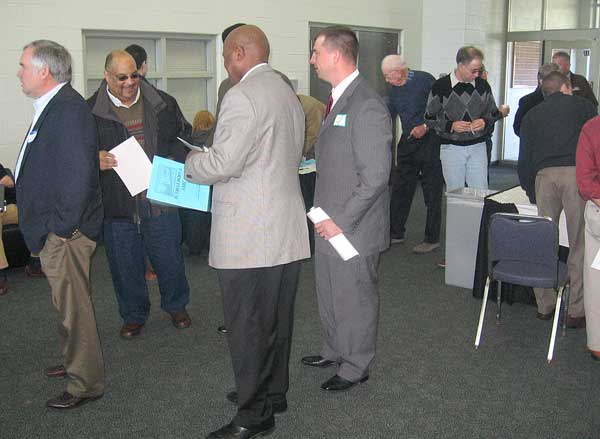
|
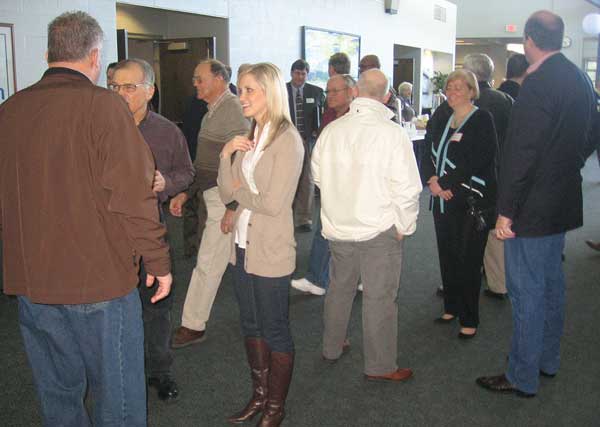
|
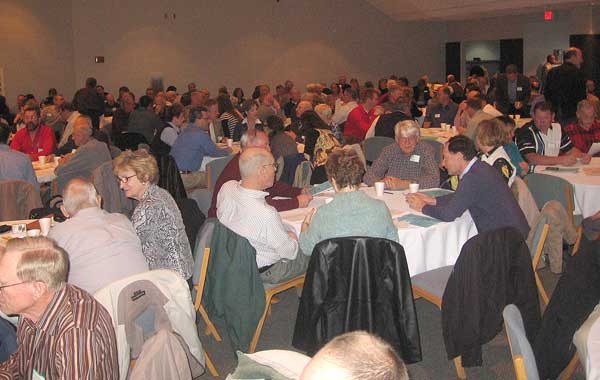
|
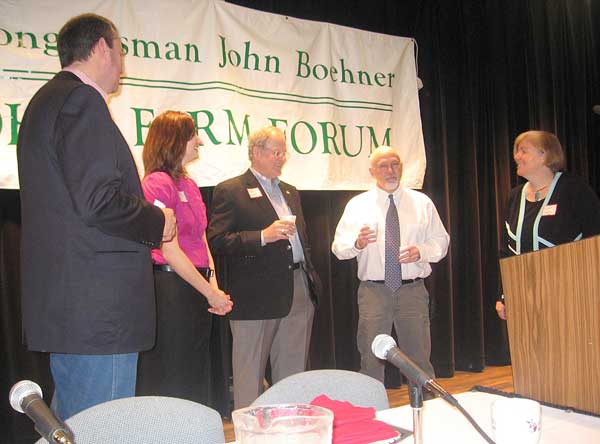
|
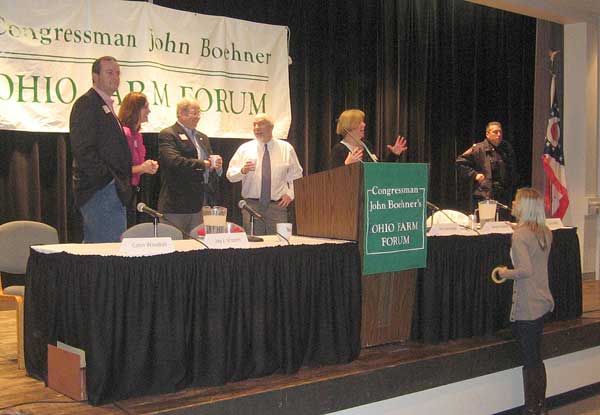
|
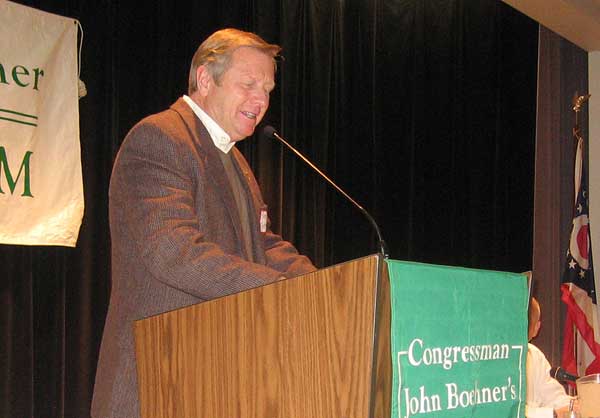
|
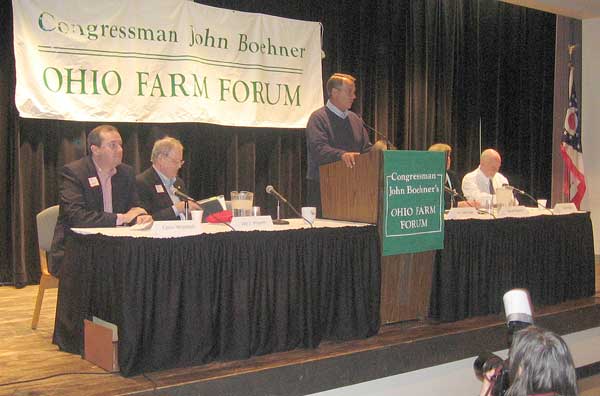
|
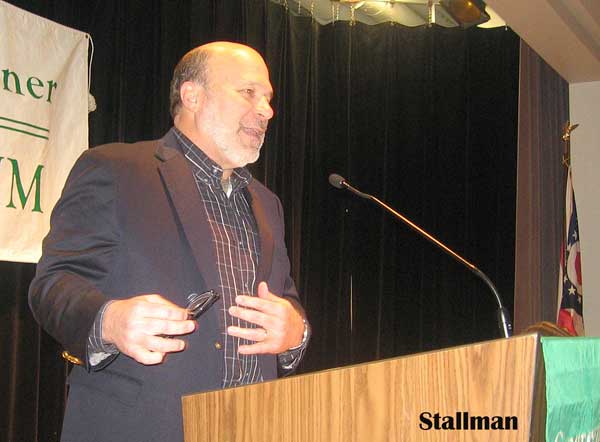
|
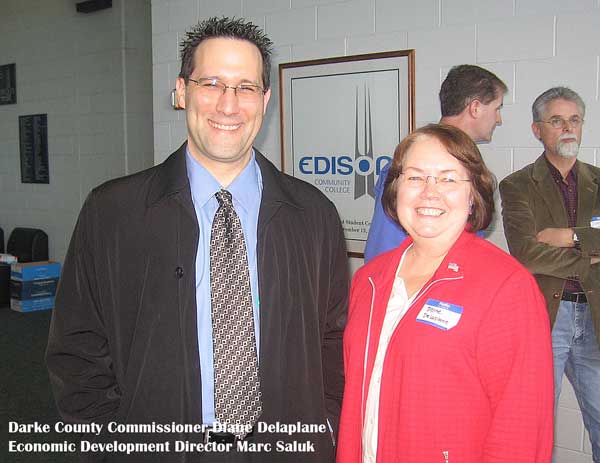
|
|
|
|

